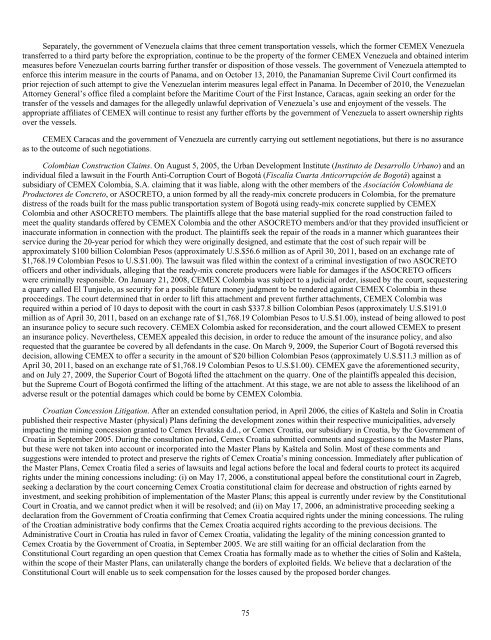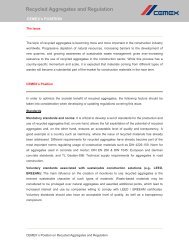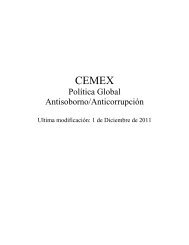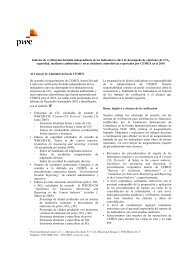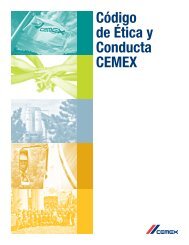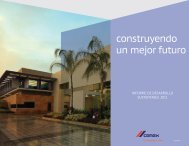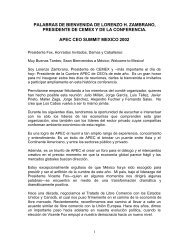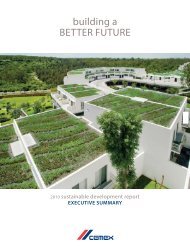building a STRONGER foundation - Cemex
building a STRONGER foundation - Cemex
building a STRONGER foundation - Cemex
You also want an ePaper? Increase the reach of your titles
YUMPU automatically turns print PDFs into web optimized ePapers that Google loves.
Separately, the government of Venezuela claims that three cement transportation vessels, which the former CEMEX Venezuela<br />
transferred to a third party before the expropriation, continue to be the property of the former CEMEX Venezuela and obtained interim<br />
measures before Venezuelan courts barring further transfer or disposition of those vessels. The government of Venezuela attempted to<br />
enforce this interim measure in the courts of Panama, and on October 13, 2010, the Panamanian Supreme Civil Court confirmed its<br />
prior rejection of such attempt to give the Venezuelan interim measures legal effect in Panama. In December of 2010, the Venezuelan<br />
Attorney General’s office filed a complaint before the Maritime Court of the First Instance, Caracas, again seeking an order for the<br />
transfer of the vessels and damages for the allegedly unlawful deprivation of Venezuela’s use and enjoyment of the vessels. The<br />
appropriate affiliates of CEMEX will continue to resist any further efforts by the government of Venezuela to assert ownership rights<br />
over the vessels.<br />
CEMEX Caracas and the government of Venezuela are currently carrying out settlement negotiations, but there is no assurance<br />
as to the outcome of such negotiations.<br />
Colombian Construction Claims. On August 5, 2005, the Urban Development Institute (Instituto de Desarrollo Urbano) and an<br />
individual filed a lawsuit in the Fourth Anti-Corruption Court of Bogotá (Fiscalía Cuarta Anticorrupción de Bogotá) against a<br />
subsidiary of CEMEX Colombia, S.A. claiming that it was liable, along with the other members of the Asociación Colombiana de<br />
Productores de Concreto, or ASOCRETO, a union formed by all the ready-mix concrete producers in Colombia, for the premature<br />
distress of the roads built for the mass public transportation system of Bogotá using ready-mix concrete supplied by CEMEX<br />
Colombia and other ASOCRETO members. The plaintiffs allege that the base material supplied for the road construction failed to<br />
meet the quality standards offered by CEMEX Colombia and the other ASOCRETO members and/or that they provided insufficient or<br />
inaccurate information in connection with the product. The plaintiffs seek the repair of the roads in a manner which guarantees their<br />
service during the 20-year period for which they were originally designed, and estimate that the cost of such repair will be<br />
approximately $100 billion Colombian Pesos (approximately U.S.$56.6 million as of April 30, 2011, based on an exchange rate of<br />
$1,768.19 Colombian Pesos to U.S.$1.00). The lawsuit was filed within the context of a criminal investigation of two ASOCRETO<br />
officers and other individuals, alleging that the ready-mix concrete producers were liable for damages if the ASOCRETO officers<br />
were criminally responsible. On January 21, 2008, CEMEX Colombia was subject to a judicial order, issued by the court, sequestering<br />
a quarry called El Tunjuelo, as security for a possible future money judgment to be rendered against CEMEX Colombia in these<br />
proceedings. The court determined that in order to lift this attachment and prevent further attachments, CEMEX Colombia was<br />
required within a period of 10 days to deposit with the court in cash $337.8 billion Colombian Pesos (approximately U.S.$191.0<br />
million as of April 30, 2011, based on an exchange rate of $1,768.19 Colombian Pesos to U.S.$1.00), instead of being allowed to post<br />
an insurance policy to secure such recovery. CEMEX Colombia asked for reconsideration, and the court allowed CEMEX to present<br />
an insurance policy. Nevertheless, CEMEX appealed this decision, in order to reduce the amount of the insurance policy, and also<br />
requested that the guarantee be covered by all defendants in the case. On March 9, 2009, the Superior Court of Bogotá reversed this<br />
decision, allowing CEMEX to offer a security in the amount of $20 billion Colombian Pesos (approximately U.S.$11.3 million as of<br />
April 30, 2011, based on an exchange rate of $1,768.19 Colombian Pesos to U.S.$1.00). CEMEX gave the aforementioned security,<br />
and on July 27, 2009, the Superior Court of Bogotá lifted the attachment on the quarry. One of the plaintiffs appealed this decision,<br />
but the Supreme Court of Bogotá confirmed the lifting of the attachment. At this stage, we are not able to assess the likelihood of an<br />
adverse result or the potential damages which could be borne by CEMEX Colombia.<br />
Croatian Concession Litigation. After an extended consultation period, in April 2006, the cities of Kaštela and Solin in Croatia<br />
published their respective Master (physical) Plans defining the development zones within their respective municipalities, adversely<br />
impacting the mining concession granted to <strong>Cemex</strong> Hrvatska d.d., or <strong>Cemex</strong> Croatia, our subsidiary in Croatia, by the Government of<br />
Croatia in September 2005. During the consultation period, <strong>Cemex</strong> Croatia submitted comments and suggestions to the Master Plans,<br />
but these were not taken into account or incorporated into the Master Plans by Kaštela and Solin. Most of these comments and<br />
suggestions were intended to protect and preserve the rights of <strong>Cemex</strong> Croatia’s mining concession. Immediately after publication of<br />
the Master Plans, <strong>Cemex</strong> Croatia filed a series of lawsuits and legal actions before the local and federal courts to protect its acquired<br />
rights under the mining concessions including: (i) on May 17, 2006, a constitutional appeal before the constitutional court in Zagreb,<br />
seeking a declaration by the court concerning <strong>Cemex</strong> Croatia constitutional claim for decrease and obstruction of rights earned by<br />
investment, and seeking prohibition of implementation of the Master Plans; this appeal is currently under review by the Constitutional<br />
Court in Croatia, and we cannot predict when it will be resolved; and (ii) on May 17, 2006, an administrative proceeding seeking a<br />
declaration from the Government of Croatia confirming that <strong>Cemex</strong> Croatia acquired rights under the mining concessions. The ruling<br />
of the Croatian administrative body confirms that the <strong>Cemex</strong> Croatia acquired rights according to the previous decisions. The<br />
Administrative Court in Croatia has ruled in favor of <strong>Cemex</strong> Croatia, validating the legality of the mining concession granted to<br />
<strong>Cemex</strong> Croatia by the Government of Croatia, in September 2005. We are still waiting for an official declaration from the<br />
Constitutional Court regarding an open question that <strong>Cemex</strong> Croatia has formally made as to whether the cities of Solin and Kaštela,<br />
within the scope of their Master Plans, can unilaterally change the borders of exploited fields. We believe that a declaration of the<br />
Constitutional Court will enable us to seek compensation for the losses caused by the proposed border changes.<br />
75


